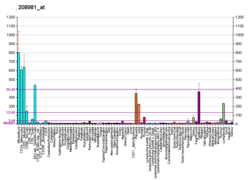Platelet endothelial cell adhesion molecule (PECAM-1) also known as cluster of differentiation 31 (CD31) is a protein that in humans is encoded by the PECAM1 gene found on chromosome17q23.3.[5][6][7][8] PECAM-1 plays a key role in removing aged neutrophils from the body.
- ^ a b c GRCh38: Ensembl release 89: ENSG00000261371 – Ensembl, May 2017
- ^ a b c GRCm38: Ensembl release 89: ENSMUSG00000020717 – Ensembl, May 2017
- ^ "Human PubMed Reference:". National Center for Biotechnology Information, U.S. National Library of Medicine.
- ^ "Mouse PubMed Reference:". National Center for Biotechnology Information, U.S. National Library of Medicine.
- ^ Cite error: The named reference
entrezwas invoked but never defined (see the help page). - ^ Newman PJ, Berndt MC, Gorski J, White GC, Lyman S, Paddock C, Muller WA (March 1990). "PECAM-1 (CD31) cloning and relation to adhesion molecules of the immunoglobulin gene superfamily". Science. 247 (4947): 1219–1222. Bibcode:1990Sci...247.1219N. doi:10.1126/science.1690453. PMID 1690453.
- ^ Gumina RJ, Kirschbaum NE, Rao PN, vanTuinen P, Newman PJ (June 1996). "The human PECAM1 gene maps to 17q23". Genomics. 34 (2): 229–232. doi:10.1006/geno.1996.0272. PMID 8661055.
- ^ Xie Y, Muller WA (October 1996). "Fluorescence in situ hybridization mapping of the mouse platelet endothelial cell adhesion molecule-1 (PECAM1) to mouse chromosome 6, region F3-G1". Genomics. 37 (2): 226–228. doi:10.1006/geno.1996.0546. PMID 8921400.







